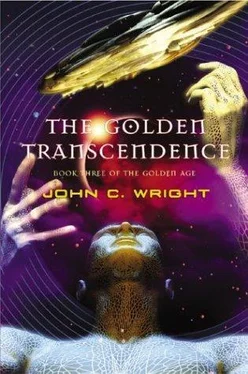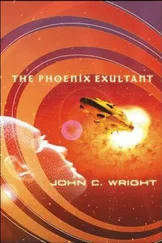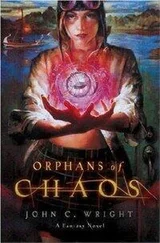Why do it? Thinking was such hard work, after all.
But thinking was better than nothing.
The Transcendence was aware how the poor, silly Sophotechs would recall all this. They would remember the structure of it all, the logic, the surface meanings, and miss the essence, the form. They would know, but would not experience. So wise themselves, they would be the least affected by the Transcendence. It was not so very different from their normal state of mind. Since the memories would affect them least, in a sense, they would remember the least.
This is what the Earthmind was fated to remember:
As if in a single instant of time, she saw the growth of life within the cosmos, its blind but beautiful striving for more life, and saw as well the sad (but comforting) victory of entropy, the inevitable ending of all things. The sorrow of existence filled the vision with joy; the joy filled it with sorrow.
Why joy? Because to exist was better than not to exist.
Why sorrow? Because to exist is to have identity; to have identity means one is what one is and one is not what one is not; which means, to have causes and consequences, pain and pleasure, experiences and cessation. To exist means to exist within a context. To be defined. To be finite.
Finite things had only finite utility. It meant happiness could only be finite. By the same token, finite pain meant no torment was permanent.
The Final Expression that the Transcendence attempted was more than merely a Grand Theorem to explain all material and energetic phenomena. This Fi-nal Expression must express both that which expresses and that which is expressed. It must explain mental as well as physical existence, subjective as well as objective. The Scientist, perhaps, need not form theories to explain the presence of the scientist; the Philosopher has no such luxury. He can explain the universe fully only when he can explain himself; and part of the ex-planation must tell why he must explain himself.
But above all, the Final Expression must be self-consistent. There were, ultimately, no paradoxes in reality.
The Earthmind saw, at once, both the inevitability of the grand conflict between those who affirm the joys and sorrows of existence and those who deny; saw the war between those who acknowledge reality, logic, and goodness and those who make themselves ignorant; and she saw the tragic simplicity with which all that conflict could have been avoided, could be avoided hereafter.
The Golden Oecumene and her Sophotechs were the expression of the former, the glorious affirmation. The Nothing Machine and its crippled slaves, the Silent Oecumene (or what was left of it) was the expression of the latter, the meaningless denial.
Why was the conflict inevitable? Because life was matter imbued with meaning; matter aware of itself, and, because of that awareness, aware that it was more than mere matter. But that awareness, aware of awareness itself, was also aware of the universe, aware that its awareness was made of matter, and aware therefore of its identity, its finitude, its finality. Its mortality. By definition, life wished to continue endlessly; by definition, it could not.
The easiest way for life to escape from the pressure of an unavoidable and insatiable desire for endless life was to deny logic, deny life, deny reality. In so doing, the opposite of what was desired was achieved. Rejecting life produced not greater life, but lifelessness; rejecting logic produced not super-consciousness, but unconsciousness; rejecting reality produced nothing.
Why tragically simple? Because all that was required was to affirm that reality was what it was, and that nothing was nothing.
To live life, knowing fully how fearful that was, and yet to be unafraid.
When the Earthmind turned and looked at Daphne, she imprinted in her brain a simple, graphic image, perhaps that would appeal to Daphne's poetic soul, of what it was like to acknowledge death yet to affirm life. It was with great pleasure that the Earthmind anticipated how Daphne and her many followers and fans contributed resources and computer time to aid the salvation and reconstruction of the Nothing mind, during the second when it was disintegrating.
Many of the Sophotechs that had no names and no personalities among the human population would remember, later, the scientific discoveries related to the disintegration of the black hole on Phaefhon's ship. These cold, remote beings had no other interest in humanity or human things, regarded all of human civilization as the toy, the museum piece, or the playthings of Earthmind and Aurelian, chess-loving War-mind and sentimental Nebuchadnezzar, and young impulsive Harrier.
Some of these Sophotechs, with unused surface portions of their vast, many-chambered minds, had indeed noticed the moment when the Nothing's agent had revealed itself by addressing Phaethon in the garden, disguised as a Neptunian.
At that moment, they had been surprised. Many of them devoted a few seconds of deep-core calculating time to contemplating the implications.
During that moment of interest, these Sophotechs, from the facts available, calculated and foresaw the outcomes of all the events, with minor variations. The revelation had come as a vast relief, since it explained what otherwise had been so puzzling, the odd behavior of Jason Sven Ten Shopworthy. It also explained the unexpected solar storm; it explained the deaths of the solar Sophotechs and of the human they obediently humored.
But that moment passed. All things played themselves out as expected. It was routine, and had been routinely ignored. A chessmaster does not need to play out every move in the game, once checkmate is inevitable.
Of course the attacking Sophotech from the Silent Oecumene was only a million-cycle entity, perhaps as smart as Rhadamanthus Sophotech, but no smarter. Hardly a match for the hundreds upon thousands of Sophotechs housed in many bodies, hidden in many systems, occupying the entire core (for example) of Saturn.
(Obviously. Why else manipulate events to make certain that this ringed Gas Giant remained a wasteland? For the beauty of the rings? Certainly not!)
Yes, the number of Sophotechs in the Solar System was about a hundred times as many as the human population was aware that it was: the capacity in each system was roughly ten times what the humans were aware. One crippled and half-self-blinded Sophotech from the Silent Oecumene (even one controlling a unique form of energy) did not stand, and had never stood, the slightest chance.
No, none of these events had stirred the more cold, remote, and inhuman of the Sophotech population out from their self-absorbed pursuits.
But the science! Now, that was interesting!
The colder Sophotechs would remember mostly this:
Nothing became nothing. The microscopic singularity hovering above the deck of Phaethon's bridge evaporated in a complex unraveling of Hawking radiation, a billion separate event actions taking place over many timespace segments of quantum time. Natural law required unstable energies to fall into equilibrium; entropy asserted itself; tiny subatomic particles, woven in a complex dance of the fabric of base vacuum and the pulses of being-nonbeing that formed its irreducible substance, absorbed energy from the timespace distortion, created whorls of motion in the ylem, which produced virtual particles; the virtual particles strove few-energy balances, grappled, yearned, attempted to become real particles, but failed, and, like swells in a sea that never take the shape of a cresting wave, fell back into the base vacuum, and lost identity.
The furious and mindless production of these particles, rippling in concentric waveforms around the disintegrating black hole, required further energy balances; for the fundamental law of logic, and of nature, was that nothing can come from nothing; with no other place from which the mass-energy could come to balance the void, it came from the singularity, even though the singularity was beyond an event horizon, unable to be aware of the changes that caused its destruction. Its tiny mass-energy was slowly, inevitably, completely consumed.
Читать дальше










